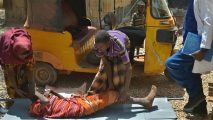Privacy Overview
This website uses cookies so that we can provide you with the best user experience possible. Cookie information is stored in your browser and performs functions such as recognising you when you return to our website and helping our team to understand which sections of the website you find most interesting and useful.


















22, November 2023
Biya regime receives first shipment of GSK’s Mosquirix malaria vaccine 0
Cameroon received its first shipment of Mosquirix malaria vaccines manufactured by British drugmaker GSK Plc late on Tuesday, as the nation struggles with the mosquito-borne disease that kills more than 600,000 each year globally.
A batch of 331,200 doses of the vaccine – also known as RTS,S – was offloaded at Yaounde’s Nsimalen International Airport, making Cameroon the first African country to receive the vaccine after the pilot programmes in Ghana, Kenya and Malawi.
Malaria remains one of Africa’s deadliest diseases, according to the World Health Organization, killing nearly half a million children under the age of five, and accounting for approximately 95% of global malaria cases in 2021.
The initial consignment of vaccines will go to 42 out of 203 health districts in the country, Cameroon’s health minister Manaouda Malachie said.
“We lose many compatriots who die because of this disease. Today, we have a vaccine which comes to add to the panoply of measures already rolled out,” Malachie told reporters at Nsimalen.
Inoculations will begin next month or early next year, according to a health official who spoke to Reuters on condition of anonymity.
GSK says more than 1.7 million children in Ghana, Kenya and Malawi have already received at least one dose of the shot, and that it would be rolled out in another nine malaria-endemic countries, of which Cameroon is one, from early next year.
UNICEF representative Juliette Haenni said it was a historic moment to protect children.
“Children are the most concerned. The ones we are targeting are the six to 24 months old – the most vulnerable,” Haenni said.
The WHO says a second malaria vaccine developed by Britain’s University of Oxford, R21/Matrix-M, will become available by mid-2024.
Source: Reuters